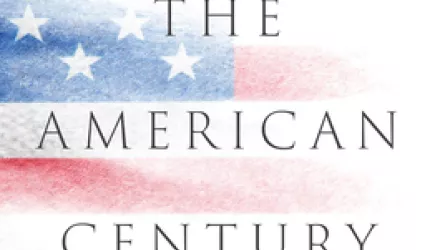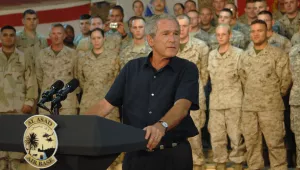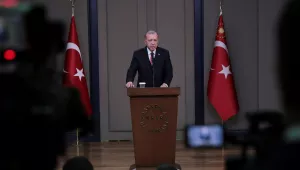What happened to the world's transition to secularism?
Religion was supposed to fade away as globalization and freedom spread. Instead, it's booming around the world, often deciding who gets elected. And the divine intervention is just beginning. Democracy is giving people a voice, and more and more, they want to talk about God.
After Hamas won a decisive victory in January's Palestinian elections, one of its supporters replaced the national flag that flew over parliament with its emerald-green banner heralding, "There is no God but God, and Muhammad is His Prophet."
Days after the prophet's banner was unfurled in Ramallah, thousands of Muslims mounted a vigorous, sometimes violent, defense of the prophet's honor in cities as far-flung as Beirut, Jakarta, London and New Delhi. Outraged by cartoons of Muhammad originally published in Denmark, Islamic groups, governments and individuals staged demonstrations, boycotts and embassy attacks.
On their own, these events appeared to be sudden eruptions of "Muslim rage." In fact, they were only the most recent outbreaks of a deep undercurrent that has been gathering force for decades and extends far beyond the Muslim world.
Global politics is increasingly marked by what could be called "prophetic politics." Voices claiming transcendent authority are filling public spaces and winning key political contests. These movements come in very different forms and employ widely varying tools. But whether the field of battle is democratic elections or the more inchoate struggle for global public opinion, religious groups are increasingly competitive. In contest after contest, when people are given a choice between the sacred and the secular, faith prevails.
God is on a winning streak. It was reflected in the 1979 Iranian revolution, the rise of the Taliban in Afghanistan, the Shia revival and religious strife in postwar Iraq, and Hamas's recent victory in Palestine and Israel's struggle with Hezbollah in Lebanon. But not all the thunderbolts have been hurled by Allah.
The struggle against apartheid in South Africa in the 1980s and early 1990s was strengthened by prominent Christian leaders such as Archbishop Desmond K. Tutu. Hindu nationalists in India stunned the international community when they unseated India's ruling party in 1998 and then tested nuclear weapons.
American evangelicals continue to surprise the U.S. foreign-policy establishment with their activism and influence on issues such as religious freedom, sex trafficking, Sudan and AIDS in Africa. Indeed, evangelicals have emerged as such a powerful force that religion was a stronger predictor of vote choice in the 2004 U.S. presidential election than was gender, age, or class.
The spread of democracy, far from checking the power of militant religious activists, will probably only enhance the reach of prophetic political movements, many of which will emerge from democratic processes more organized, more popular, and more legitimate than before — but quite possibly no less violent.
It did not always seem this way. In April 1966, Time ran a cover story that asked, "Is God Dead?" It was a fair question. Secularism dominated world politics in the mid-1960s. The conventional wisdom shared by many intellectual and political elites was that modernization would inevitably extinguish religion's vitality. But if 1966 was the zenith of secularism's self-confidence, the next year marked the beginning of the end of its global hegemony.
In 1967, the leader of secular Arab nationalism, Gamal Abdel Nasser, suffered a humiliating defeat at the hands of the Israeli armed forces. By the end of the 1970s, Iran's Ayatollah Khomeini, avowedly "born-again" U.S. President Jimmy Carter, television evangelist Jerry Falwell and Pope John Paul II were all walking the world stage.
A decade later, rosary-wielding Solidarity members in Poland and Kalashnikov-toting mujahedeen in Afghanistan helped defeat atheistic Soviet communism. A dozen years later, 19 hijackers screaming "God is great" transformed world politics.
Today, the secular pan-Arabism of Nasser has given way to the millennarian pan-Islamism of Iranian President Mahmoud Ahmadinejad, whose religious harangues against America and Israel resonate with millions of Muslims, Sunni and Shia alike. "We increasingly see that people around the world are flocking towards a main focal point — that is the Almighty God," Ahmadinejad declared in his recent letter to President Bush.
This comes as the world indeed becomes more modern: It enjoys more political freedom, more democracy and more education than perhaps at any time in history.
It is also wealthier. The average share of people in developing countries living on less than a dollar a day fell from 28 percent to 22 percent between 1990 and 2002, according to World Bank estimates.
But this has not led to people becoming more secular. In fact, the period in which economic and political modernization has been most intense — the past 30 to 40 years — has witnessed a jump in religious vitality around the world.
According to the World Christian Encyclopedia, a greater proportion of the world's population adhered to the major religious systems in 2000 —Christianity's Catholicism and Protestanism, Islam and Hinduism — than a century earlier.
At the beginning of the 20th century, a bare majority of the world's people, precisely 50 percent, were Catholic, Protestant, Muslim or Hindu. At the beginning of the 21st century, nearly 64 percent were. The proportion may be close to 70 percent by 2025.
The World Values Survey, which covers 85 percent of the world's population, confirms religion's growing vitality. According to scholars Ronald Inglehart and Pippa Norris, "the world as a whole now has more people with traditional religious views than ever before — and they constitute a growing proportion of the world's population."
Not only is religious observance spreading, it is becoming more devout. In Brazil, China, Nigeria, Russia, South Africa and the United States, religiosity became more vigorous between 1990 and 2001.
Between 1987 and 1997, surveys by the Times Mirror Center and the Pew Research Center registered increases of 10 percent or more in the proportions of Americans surveyed who "strongly agreed" that God existed, that they would have to answer for their sins before God, that God performs miracles, and that prayer was an important part of their daily life. Even in Europe, a secular stronghold, there have been surprising upticks in religiosity.
God's comeback is in no small part due to the global expansion of freedom. People in dozens of countries have been empowered to shape their public lives in ways that were inconceivable in the 1950s and 1960s. In country after country, politically empowered groups began to challenge the secular constraints imposed by the first generation of modernizing, post-independence leaders.
Often, as in communist countries, secular straitjackets had been imposed by sheer coercion; in other cases, as in Atatürk's Turkey, Nehru's India, and Nasser's Egypt, secularism retained legitimacy because elites considered it essential to national integration and modernization — and because of the sheer charisma of these countries' founding fathers. In Latin America, right-wing dictatorships, sometimes in cahoots with the Catholic Church, imposed restrictions that severely limited grass-roots religious influences, particularly from "liberation theology" and Protestant "sects."
As politics liberalized in countries like India, Mexico, Nigeria, Turkey, and Indonesia in the late 1990s, religion's influence on political life increased dramatically. Even in the United States, evangelicals exercised a growing influence on the Republican Party in the 1980s and 1990s, partly because the presidential nomination process depended more on popular primaries and less on the decisions of traditional party leaders. Where political systems reflect people's values, they usually reflect people's strong religious beliefs.
Many observers are quick to dismiss religion's advance into the political sphere as the product of elites manipulating sacred symbols to mobilize the masses. In fact, the marriage of religion with politics is often welcomed, if not demanded, by people around the world.
In a 2002 Pew Global Attitudes survey, 91 percent of Nigerians and 76 percent of Bangladeshis agreed that religious leaders should be more involved in politics. A June 2004 six-nation survey reported that "most Arabs polled said that they wanted the clergy to play a bigger role in politics." In the same survey, majorities or pluralities in Morocco, Saudi Arabia, Jordan and the United Arab Emirates cited Islam as their primary identity, trumping nationality.
The collapse of the quasi-secular Baathist dictatorship in Iraq released religious and ethnic allegiances and has helped Islam play a dominant role in the country's political life, including in its recently adopted constitution.Evangelicals have become an influential voting bloc in numerous Latin American countries, including Brazil, Guatemala, and Nicaragua.
Far from stamping out religion, modernization has spawned a new generation of savvy and technologically adept religious movements, including evangelical Protestantism in America, "Hindutva" in India, Salafist and Wahhabi Islam in the Middle East, Pentecostalism in Africa and Latin America, and Opus Dei and the charismatic movement in the Catholic Church. The most dynamic religiosity today is not so much "old-time religion" as it is radical, modern and conservative.
A common denominator of these neo-orthodoxies is the deployment of sophisticated and politically capable organizations. These modern organizations effectively marshal specialized institutions as well as the latest technologies to recruit new members, strengthen connections with old ones, deliver social services, and press their agenda in the public sphere.
The Vishwa Hindu Parishad, founded in 1964, "saffronized" large swaths of India through its religious and social activism and laid the groundwork for the Bharatiya Janata Party's electoral successes in the 1990s. Similar groups in the Islamic world include the Muslim Brotherhood in Egypt and Jordan, Hamas in the Palestinian territories, Hezbollah in Lebanon, and the Nahdlatul Ulama in Indonesia. In Brazil, pentecostals have organized their own legislative caucus, representing 10 percent of congresspeople
Today's neo-orthodoxies may effectively use the tools of the modern world, but how compatible are they with modern democracy? Religious radicals, after all, can quickly short-circuit democracy by winning power and then excluding nonbelievers. Just as dangerous, politicized religion can spark civil conflict. Since 2000, 43 percent of civil wars have been religious (only a quarter were religiously inspired in the 1940s and 1950s). Extreme religious ideology is, of course, a leading motivation for most transnational terrorist attacks.
The scorecard isn't all negative, however. Religion has mobilized millions of people to oppose authoritarian regimes, inaugurate democratic transitions, support human rights and relieve human suffering.
Today's religious movements, however, may not have as much success in promoting sustainable freedom. Catholicism's highly centralized and organized character made it an effective competitor with the state, and its institutional tradition helped it adapt to democratic politics. Islam and pentecostalism, by contrast, are not centralized under a single leadership or doctrine that can respond coherently to fast-moving social or political events. Local religious authorities are often tempted to radicalize in order to compensate for their weakness vis-a-vis the state or to challenge more established figures.
The trajectory of the young cleric Moqtada al-Sadr in postwar Iraq is not unusual. The lack of a higher authority for religious elites might explain why most religious civil wars since 1940 — 34 of 42 — have involved Islam, with nine of these being Muslim versus Muslim. We need look no further than Iraq today to see religious authorities successfully challenging the forces of secularism — but also violently competing with each other.
Even in a longstanding democracy like India, the political trajectory of Hindu nationalism has demonstrated that democratic institutions do not necessarily moderate these instincts: Where radical Hindu nationalists have had the right mix of opportunities and incentives, they have used religious violence to win elections, most dramatically in the state of Gujarat.
The belief that outbreaks of politicized religion are temporary detours on the road to secularization was plausible in 1976, 1986, or even 1996. Today, the argument is untenable. As a framework for explaining and predicting the course of global politics, secularism is increasingly unsound. God is winning in global politics. And modernization, democratization, and globalization have only made him stronger.
Timothy Samuel Shah is senior fellow in religion and world affairs at the Pew Forum on Religion & Public Life. Monica Duffy Toft is associate professor of public policy at the John F. Kennedy School of Government and assistant director of the John M. Olin Institute for Strategic Studies at Harvard University.
Shah, Timothy Samuel. “Religion's Flame Burns Brighter Than Ever.” Baltimore Sun, August 20, 2006



